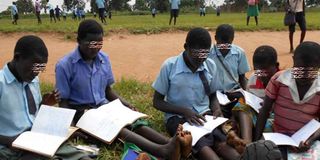Lira leaders agree to sexual education in district schools

Pupils of Walela Primary School revise on July 30, 2019. Leaders have agreed that children should be taught sex education. PHOTO/BILL OKETCH
What you need to know:
- Leaders say learners will be exposed to sexual education at an appropriate age.
Leaders in Lira District have agreed that children should be exposed to sex-related content “at an appropriate age” to enable them to make informed decisions about their sexual and reproductive health.
The leaders want children to be taught about dating, love, relationships, marriage, and the functionality of their body parts.
Speaking at a meeting on sexual education in Lira City last Thursday, Mr Enoch Wandera Wakwalu, the Lira deputy Resident City Commissioner, warned that if children are left on their own to discover love, relationship and dating, it might be disastrous.
“Once we leave them to discover the things by themselves it will be something else,” he said.
The Lira City principal education officer, Mr Jasper Abura, said things are getting out of hand because of the community’s resistance against sexuality education.
He said the perception that the community had about sex education was that it was an advocacy by NGOs to encourage the youth to have sex.
However, he said they have been telling the community that the idea behind the National Sexuality Education Framework is to help handle some challenges in schools such as the issues of teenage pregnancy, underage marriage and HIV/Aids.
“We have just concluded the Primary Leaving Examinations (PLE), and we have realised that most of the candidates who failed to turn up to sit for PLE were girls and a few boys. And these boys and girls are married,” Mr Abura said.
He added: “In one school, I realised a scenario where seven learners did not sit PLE and when I tried to follow up, I realised that most of them were pregnant and married off. And in one school, three pregnant girls sat for PLE.”
The National Sexuality Education Framework, which has about four pillars or themes, uses the principle of age appropriateness, according to Mr Mwesi Yosia Habagaya, the executive director of the Universal Health and Development Foundation (UHDF).
“At a certain age, the young people should be able to know about certain information. For instance, we shall not be discussing menstruation with Top Class babies. So, we are saying it’s going to be age appropriate and culturally and religiously sensitive,” he said.
Mr Tom Odok, the head teacher of Otim Tom Primary School in Lira City, said they will start advocating for comprehensive sexuality education in schools and in the communities.
“Proverb 22:6 says: ‘Train up a child in the way he should go: and when he is old, he will not depart from it.’ That is the role of the church,” Mr Odok said.
The executive director of Joy for Children Uganda, an NGO, Mr Moses Ntenga said comprehensive sexuality education enables young people to protect and advocate for their health, well-being and dignity by providing them with a necessary toolkit of knowledge, attitudes and skills.
“This framework is not very popular, partly because it faced some resistance, especially from people who didn’t understand the framework. People thought it was going to teach children about sex but it’s beyond sex; children knowing something related to sex at an age-appropriate time,” he said.
BACKGROUND
Public outcry over comprehensive sexuality education erupted in 2016 over claims that children were being taught “homosexuality” by international non-governmental organisations (NGOs).
Subsequent debates over sex education revolved around defending what public figures claimed were national, religious, and cultural values from foreign infiltration.




